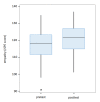Nurturing virtues of the medical profession: does it enhance medical students' empathy?
- PMID: 28704203
- PMCID: PMC5511746
- DOI: 10.5116/ijme.5951.6044
Nurturing virtues of the medical profession: does it enhance medical students' empathy?
Abstract
Objectives: To examine if the empathy levels of first-year medical students are amenable to didactic interventions idealized to promote values inherent to medical professional identity.
Methods: This is a pretest-posttest study designed to assess the empathy levels of first-year medical students (n=166) comprising two consecutive classes of a Brazilian medical school, performed before and after a didactic intervention. Students attended a course based on values and virtues related to medical professional identity once a week over four months. Every didactic approach (interviews with patients and physicians, supervised visits to the hospital, and discussion of videotaped simulated consultations) was based on "real-world" situations and designed to promote awareness of the process of socialization. Students filled out the Jefferson Scale of Physician Empathy (JSPE) on the first and last days of this course, and the pretest-posttest analysis was performed using the Wilcoxon Signed Rank Test.
Results: The mean pretest JSPE score was 117.9 (minimum 92, maximum 135) and increased to 121.3 after the intervention (minimum 101, maximum 137). The difference was significant (z=-5.2, p<.001.), with an effect size of 0.40. The observed increase was greater among students with lower initial JSPE scores.
Conclusions: Empathy is a fundamental tool used to achieve a successful physician-patient relationship, and it seems to permeate other virtues of a good physician. This study's results suggest that medical students' empathy may be amenable to early curricular interventions designed to promote a positive development of their professional identity, even when empathy is not central in discussion.
Keywords: empathy; medical education; professional identity.
Figures
Similar articles
-
Maintaining empathy in medical school: it is possible.Med Teach. 2013 Dec;35(12):1002-8. doi: 10.3109/0142159X.2013.802296. Epub 2013 Jun 19. Med Teach. 2013. PMID: 23782049
-
The impact of simulated medical consultations on the empathy levels of students at one medical school.Acad Med. 2014 Apr;89(4):632-7. doi: 10.1097/ACM.0000000000000175. Acad Med. 2014. PMID: 24556779 Free PMC article.
-
Medical students' self-reported empathy and simulated patients' assessments of student empathy: an analysis by gender and ethnicity.Acad Med. 2011 Aug;86(8):984-8. doi: 10.1097/ACM.0b013e3182224f1f. Acad Med. 2011. PMID: 21694558
-
Interventions for improving medical students' interpersonal communication in medical consultations.Cochrane Database Syst Rev. 2021 Feb 8;2(2):CD012418. doi: 10.1002/14651858.CD012418.pub2. Cochrane Database Syst Rev. 2021. PMID: 33559127 Free PMC article.
-
[Empathy-building of physicians. Part II--Early exposure of students to patient's situation].Pol Merkur Lekarski. 2010 Oct;29(172):282-6. Pol Merkur Lekarski. 2010. PMID: 21207649 Review. Polish.
Cited by
-
Civic-Mindedness Sustains Empathy in a Cohort of Physical Therapy Students: A Pilot Cohort Study.J Patient Exp. 2020 Apr;7(2):185-192. doi: 10.1177/2374373519837246. Epub 2019 Mar 19. J Patient Exp. 2020. PMID: 32851139 Free PMC article.
-
Exploring the use of virtues to facilitate identity construction among management students.Eur Manag J. 2021 Feb;39(1):109-117. doi: 10.1016/j.emj.2020.08.005. Epub 2020 Sep 2. Eur Manag J. 2021. PMID: 38620331 Free PMC article.
-
Adopting a pedagogy of connection for medical education.Med Educ. 2025 Jan;59(1):37-45. doi: 10.1111/medu.15486. Epub 2024 Aug 1. Med Educ. 2025. PMID: 39089707 Free PMC article.
-
A systematic scoping review of approaches to teaching and assessing empathy in medicine.BMC Med Educ. 2021 May 22;21(1):292. doi: 10.1186/s12909-021-02697-6. BMC Med Educ. 2021. PMID: 34020647 Free PMC article.
-
The Educational Effects of a Pregnancy Simulation in Medical/Nursing Students and Professionals.BMC Med Educ. 2019 May 24;19(1):168. doi: 10.1186/s12909-019-1589-8. BMC Med Educ. 2019. PMID: 31126341 Free PMC article.
References
-
- Colgan R. Advice to the young physician - on the art of medicine: Springer US; 2010.
MeSH terms
LinkOut - more resources
Full Text Sources
Other Literature Sources
Medical


